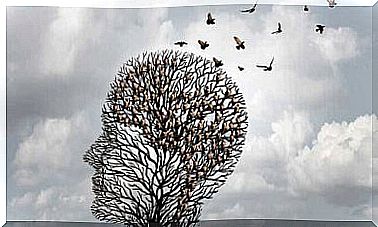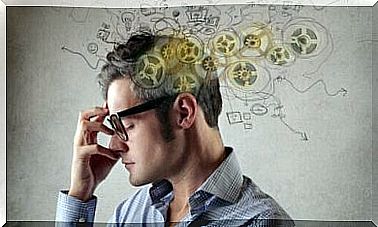Protecting Self-esteem With Cognitive Biases

Man is considered the logical animal. In fact, people are capable of formalizing thought to the extreme and endow it with reason and logic to solve problems. We can be very aseptic, impartial and choose the option that logical thinking defends. It seems incredible that, at the same time, our way of acting is often conditioned or influenced by cognitive biases.
Instead of treating information dispassionately, we tend to get carried away by the desire that this information be at the service of the self, of our self. Thus, although we have immense rational capacities, their use in reality is limited when the information is related to us, to our daily lives and to decisive moments in our lives. On those occasions we are often victims of our cognitive biases.
Cognitive biases: man as a resource economizer
Man is sometimes considered a miser or cognitive pauper because he uses shortcuts or heuristics. In addition, certain limitations such as cognitive laziness, strengthen the paradigm of cognitive miser.
The human being seeks to survive, and develops his techniques at the cost of rational accuracy. Therefore, that we are victims of cognitive biases is not by chance. Cognitive biases are at the service of the person, and more specifically, according to A. Greenwald (1995), at the service of their self-esteem.
Greenwald studied how certain cognitive biases were aimed at maintaining a good self-image, consistent self-esteem, and beneficial emotional states for the person. It instrumentalizes biases in such a way that, in pursuit of a positive self-concept, certain rules of logical thinking are rejected.
Greenwald spoke of three types of bias: self-centeredness, benevolence, and cognitive conservatism. Next, we explain its operation and its impact on personal psychological well-being.

Egocentrism: we are the protagonists
Greenwald found that people, despite their logical cognitive functioning, have a certain tendency to consider that their role in events is greater. We tend to see ourselves as protagonists of past stories where perhaps our participation was not so relevant. In addition, we remember much more clearly what affects us directly.
Similarly, self-centeredness is observed in what is called self-image bias in psychology. Human beings tend to pay special attention in other people to those traits that we share with them.
The effect of false consensus
Another bias that usually appears in human beings, and that protects their way of thinking and their self-esteem, is the effect of false consensus. People often overestimate the percentage of those who agree with their way of thinking or acting.
Following this line, when giving opinions about something, most people tend to overestimate the number of people who think like them. This is a cognitive bias that, on the one hand, preserves the person’s self-esteem, but on the other, it can mislead him.
Psychological well-being, according to Greenwald, goes through egocentricity, where the voice of reason is ignored : surely not everyone thinks like us, surely our role in that story was not so important, and there are other relevant features that we will not evaluate because we will not evaluate them. have.
Benevolence: we are perfect
Similarly, benevolence towards ourselves constitutes a cognitive bias that helps us maintain self-concept. The human being is usually considered efficient and competent, while errors are attributed to external causes.
The successes are ours, but the mistakes of others. Benevolence is related to biases that have often been called egotistical, self-defense, at the service of the self …
Benevolence bias is seen when people better accept successes from failures. Failure is understood as an attack on the intelligence and capacity of the individual and has an impact on their self-efficacy. At the same time, people tend to identify with the winners, while we distance ourselves from those who have lost.
A clear example of the benevolence bias is found in the Pygmalion myth, where the author falls in love with his work for being perfect.
Narcissistic behavior could be considered an extreme and dysfunctional manifestation of the benevolence bias, since what one does is good and is considered better than what the rest do.
Cognitive conservatism: we are smart
Cognitive conservatism refers to the fact that we tend to maintain our ideas despite the fact that there is information that contradicts them. Scientific conservatism is expressed through two major biases: confirmation bias and memory rewriting.
Through confirmation bias, people often look for information that can confirm their initial hypotheses, but not falsify them. For this reason, we usually remember that information that confirms our beliefs, in addition to selectively generating arguments that fit our way of thinking, despite having data to the contrary.
This does not have to be done consciously, and we naturally observe what is going to take care of our self-concept: what tells us that we were right.
The rewriting of the memory is a bias that allows the change taking place while the belief that the change does not occur is maintained. In memory rewriting, imprecise memories are validated, and there is a tendency to believe that new opinions are not new, but have simply been present in the person all this time. The human being fears the unknown, and changes are part of that fear.

Conclusions: are cognitive biases harmful?
Cognitive biases are not in themselves negative. The objective of these makes sense, because through them we are able to maintain a consistent self-esteem.
The problem can appear when these biases are taken to the extreme. There where we never have anything to do with any mistake made, where we never accept a criticism of our ideas or where we are unable to see the good in the other without there being something of that good previously in us.
When this happens, the behavior ceases to be functional, and these biases, previously at the service of our well-being, become one of the causes for which we do not know how to act or respond to the demands of the environment correctly.
Although cognitive biases are usually put into practice unconsciously, knowing them is useful to raise, after the situations, if the judgments made are correct or if they have been, in some way, contaminated.









